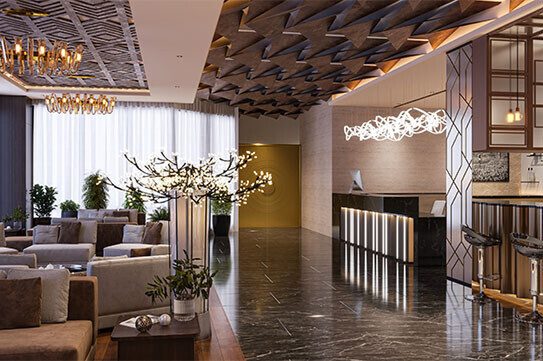Hotels operate in a fast-changing industry where guest expectations shift regularly. Travelers seek modern, comfortable, and visually appealing accommodations. How often hotels renovate depends on several factors, including competition, brand standards, and guest satisfaction. Renovations keep hotels fresh, maintain their star ratings, and improve overall profitability. A well-maintained and updated property attracts more guests and ensures repeat business.
Outdated designs, worn-out furniture, and aging infrastructure reduce bookings and damage a hotel's reputation. Let’s find out how frequent updates impact success.
Guest Expectations Change Every Few Years
Travelers develop new preferences based on emerging trends, lifestyle changes, and technological advancements. Expectations today differ from what guests wanted five or ten years ago. Modern travelers prioritize convenience, aesthetics, and seamless digital integration. Hotels that fail to meet these expectations lose appeal. Guests notice outdated décor, inefficient layouts, and missing amenities, making them less likely to return.
A fresh and inviting environment creates positive first impressions. Comfortable beds, functional workspaces, and stylish designs attract repeat guests. Frequent travelers compare properties and select those offering superior experiences. Hotels need periodic upgrades to remain desirable and avoid negative online reviews. Failure to refresh interiors and amenities reduces market competitiveness.
Outdated Designs Reduce Booking and Revenue
Worn-out furniture, faded carpets, and old-fashioned décor create an uninviting atmosphere. Guests associate poor maintenance with low service quality. A dated appearance discourages bookings, leading to declining occupancy rates. Modern travelers favor sleek, stylish, and visually appealing environments that enhance their overall stay.
Outdated properties struggle to attract new guests and maintain loyal customers. Travelers researching hotels online notice outdated pictures and negative reviews mentioning old interiors. This directly affects revenue, as potential guests choose competitors offering modernized spaces. A well-planned renovation revitalizes a property, increases room rates, and boosts guest satisfaction.
Competitors Renovate to Stay More Attractive
Hotels operate in a highly competitive industry where visual appeal and functionality influence guest choices. A property that remains unchanged for years loses its ability to stand out. Competitors that invest in renovations attract more travelers, gain better reviews, and maintain higher occupancy rates. Keeping up with industry trends ensures a hotel stays relevant.
Guests compare hotels based on aesthetics, comfort, and available amenities. A property featuring modern furnishings, smart room technology, and enhanced common areas offers a better experience. Falling behind in upgrades allows competitors to capture more bookings, leaving outdated hotels struggling to fill rooms.
Hotel Star Ratings Depend on Modern Updates
Star ratings reflect the quality of accommodations, amenities, and service. Hotels must meet specific standards to maintain their rating. Older properties risk losing their classification if interiors, services, and infrastructure become outdated. Guests seeking a four-star experience expect luxury bedding, high-end finishes, and updated technology.
Renovations directly impact a hotel's ability to meet or exceed star-rating requirements. Updating rooms, bathrooms, lobbies, and dining areas keeps a property aligned with industry expectations. Higher ratings attract more bookings, increase revenue, and improve brand reputation. Failing to modernize leads to a drop in ranking and fewer reservations.
Technology Upgrades Improve Guest Satisfaction
Modern travelers expect seamless technology integration. Smart room controls, fast Wi-Fi, and keyless entry enhance convenience. A hotel that lags in digital upgrades frustrates guests, leading to poor reviews and fewer bookings. Renovations focusing on technology keep hotels competitive and improve overall guest experience.
Many hotels incorporate automation, voice-activated assistants, and app-based services. These upgrades streamline check-ins, enhance security, and personalize guest stays. Travelers appreciate smart solutions that simplify their visit. Regular updates to technological infrastructure ensure a property remains appealing and efficient.
Wear and Tear Impacts Guest Experience
High guest turnover accelerates wear and tear. Carpets become stained, furniture loses its firmness, and bathroom fixtures deteriorate. Even well-maintained hotels show signs of aging after a few years. Guests notice peeling wallpaper, malfunctioning lights, and noisy air conditioning units, affecting their overall experience.
Routine maintenance helps, but full-scale renovations restore the hotel’s appeal. Replacing old fixtures, upgrading materials, and modernizing common areas create a more inviting atmosphere. A refreshed look and feel make guests more likely to return and recommend the property to others.
Brand Standards Require Periodic Renovations
Many hotels operate under a brand that sets specific quality guidelines. Franchise agreements often require periodic renovations to maintain consistency across locations. A hotel failing to meet these standards risks losing its affiliation, which impacts credibility and marketing reach.
Brand-mandated renovations cover furniture updates, color schemes, and overall aesthetics. Keeping interiors aligned with brand identity helps maintain guest loyalty. Regular updates reinforce a hotel’s commitment to excellence and ensure it remains a trusted choice for travelers.
Energy Efficiency and Sustainability Upgrades Matter
Sustainable practices play a growing role in the hospitality industry. Guests prefer eco-friendly hotels that reduce waste and improve energy efficiency. Renovations that include LED lighting, smart thermostats, and water-saving fixtures lower operational costs and appeal to environmentally conscious travelers.
Energy-efficient upgrades enhance guest comfort while improving long-term savings. Installing solar panels, using recycled materials, and adopting green building practices create a more sustainable operation. Modernizing a hotel with sustainability in mind attracts guests who prioritize responsible travel choices.
Book Your Next Hotel Renovation NYC Project With PE Builders
PE Builders brings expert craftsmanship and industry knowledge to every project. Our team delivers high-quality Hotel Renovation Services in NYC that modernize interiors, upgrade technology, and improve overall guest appeal. Skilled architects, engineers, and tradespeople collaborate to ensure excellence in every phase of construction. We also offer Commercial Hotel Construction solutions tailored to branding requirements, sustainability goals, and competitive positioning. Our commitment to quality, efficiency, and innovation makes us the trusted choice for hotel renovations. Contact PE Builders today to start your next project.

